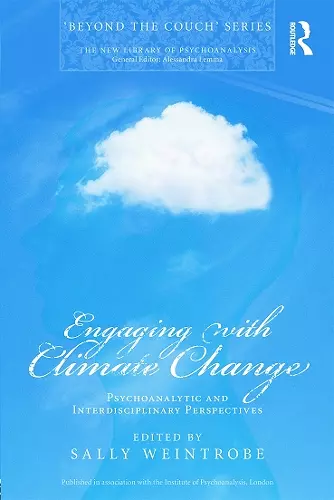Engaging with Climate Change
Psychoanalytic and Interdisciplinary Perspectives
Format:Paperback
Publisher:Taylor & Francis Ltd
Published:20th Sep '12
Currently unavailable, and unfortunately no date known when it will be back
This paperback is available in another edition too:
- Hardback£150.00(9780415667609)

How can we help and support people to face climate change?
Engaging with Climate Change is one of the first books to explore in depth what climate change actually means to people. It brings members of a wide range of different disciplines in the social sciences together in discussion and to introduce a psychoanalytic perspective. The important insights that result have real implications for policy, particularly with regard to how to relate to people when discussing the issue. Topics covered include:
- what lies beneath the current widespread denial of climate change
- how do we manage our feelings about climate change
- our great difficulty in acknowledging our true dependence on nature
- our conflicting identifications
- the effects of living within cultures that have perverse aspects
- the need to mourn before we can engage in a positive way with the new conditions we find ourselves in.
Through understanding these issues and adopting policies that recognise their implications humanity can hope to develop a response to climate change of the nature and scale necessary. Aimed at the general reader as well as psychoanalysts, psychotherapists and climate scientists, this book will deepen our understanding of the human response to climate change.
"Challenging, hopeful, timely ... Engaging with Climate Change contains perspectives about climate change by psychoanalytic writers, sociologists, social policy academics and others, with amplifying or challenging short responses, which makes for a deeper analysis." - Robert Tollemache, The Journal of Analytical Psychology, Vol. 58, 2013
"This is a rich and fascinating book that makes for gripping reading. It brings together different disciplines and is therefore interesting for a wide range of readers. The book clearly explains psychoanalytic concepts, so that a reader not accustomed to this way of thinking can gain an understanding. At the same time, there are many accounts from the consulting room and from literature, so that it is also delightful reading for those train in the field." -Helen Skogstad, Psychoanalytic Psychotherapy, 27:2
"This book is a robust contribution to a body of literature currently shaping our thinking about psychic processes in relation to climate change. The interdisciplinary nature of the book is reflected in the range of contributors, which includes sociologists, academics and psychoanalysts, and also in the diversity of content and stylistic form. The writing is incisive, lively and at times riveting, and themes are enriched and enlivened by research, literary refrences and anecodtal examples of lived experience." - Caroline Firzell, Therapy Today (September 2013)
I read this book straight through in two days. More shocking than a fantasy novel, more touching than an individual intimate story, it is an interdisciplinary book of high quality that shows how people hardly dare to face the truth about climate change and how psychoanalysis helps us explore the reality, inside and outside our minds, beyond defensive illusions and tragic disavowal- Stefano Bolognini, MD, President of the Italian Psychoanalytic Society and President Elect of the International Psychoanalytic Association
By bringing together some of the most cutting-edge and creative thinkers on the ecological crisis, this anthology builds a persuasive case for how a greater understanding of human psychology -- including the psychology of denial, compassion and cruelty -- can help break the climate deadlock. A powerful riposte to the notion that climate communicators have only two options: relentlessly terrify the public, or try to fool them into action without mentioning the word "climate." – Naomi Klein, author of "The Shock Doctrine"
Throughout the book, we are repeatedly reminded of two most basic facts; that we are all much less rational than we care to think, and that we are of, not above, the natural world. - Chris Rapley, CBE, Professor of Climate Science at University College London
"Challenging, hopeful, timely ... Engaging with Climate Change contains perspectives about climate change by psychoanalytic writers, sociologists, social policy academics and others, with amplifying or challenging short responses, which makes for a deeper analysis." - Robert Tollemache, The Journal of Analytical Psychology, Vol. 58, 2013
"This is a rich and fascinating book that makes for gripping reading. It brings together different disciplines and is therefore interesting for a wide range of readers. The book clearly explains psychoanalytic concepts, so that a reader not accustomed to this way of thinking can gain an understanding. At the same time, there are many accounts from the consulting room and from literature, so that it is also delightful reading for those train in the field." -Helen Skogstad, Psychoanalytic Psychotherapy, 27:2
"This book is a robust contribution to a body of literature currently shaping our thinking about psychic processes in relation to climate change. The interdisciplinary nature of the book is reflected in the range of contributors, which includes sociologists, academics and psychoanalysts, and also in the diversity of content and stylistic form. The writing is incisive, lively and at times riveting, and themes are enriched and enlivened by research, literary refrences and anecodtal examples of lived experience." - Caroline Firzell, Therapy Today (September 2013)
ISBN: 9780415667623
Dimensions: unknown
Weight: 432g
280 pages